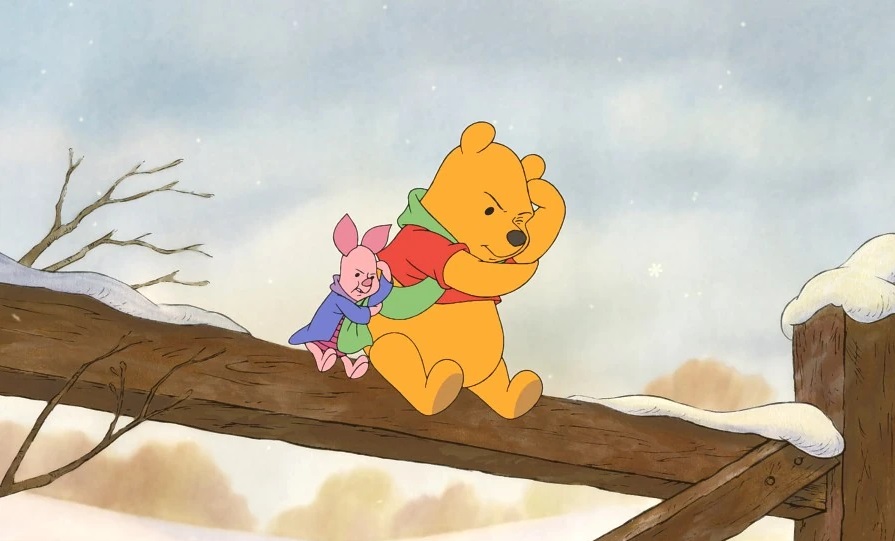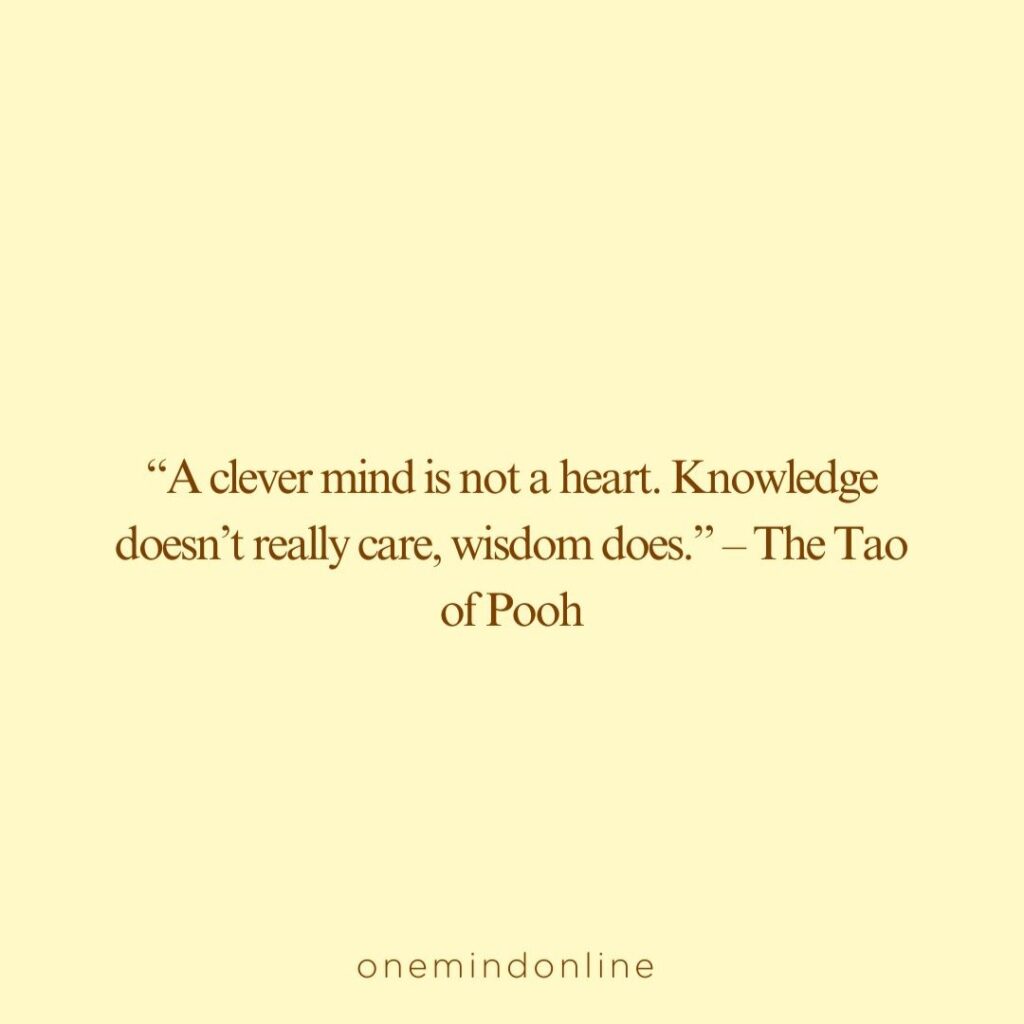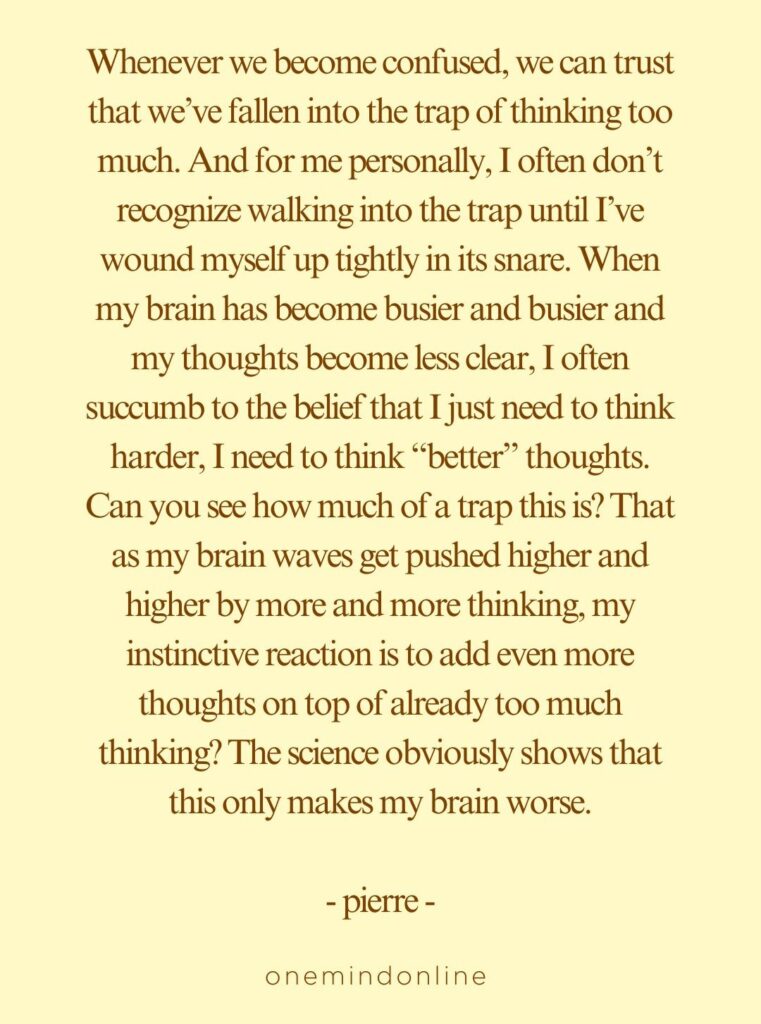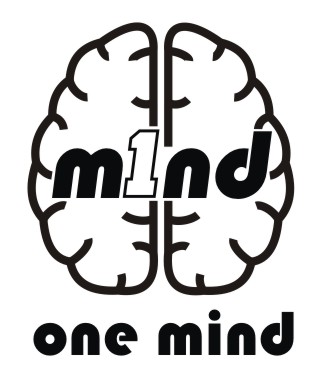
Here’s a little inspiring nugget that’ll take you about 2 minutes to chew on. Now, if you’re hungry for the whole story and want to become a true connoisseur of this topic, our menu has all the delicious details you can handle!
A message from today’s meditation:
We all fall victim to it sometimes: the belief that the harder we think, the better our thoughts will be. But what if the opposite is true? What if having too much brain is actually hindering our progress?

Today’s meditation is just about one of the simplest mindfulness practices that you can do, paying attention to your body’s physical senses. It’s extremely practical in a world where our minds get pulled into too many different directions all the time.
“Rabbit’s clever,” said Pooh thoughtfully.
“Yes,” said Piglet, “Rabbit’s clever.”
“And he has Brain.”
“Yes,” said Piglet, “Rabbit has Brain.”
There was a long silence.
“I suppose,” said Pooh, “that, that’s why he never understands anything.”
– The Tao of Pooh
“A clever mind is not a heart. Knowledge doesn’t really care, wisdom does.” – The Tao of Pooh
“The surest way to become Tense, Awkward, and Confused is to develop a mind that tries too hard – one that thinks too much.” – The Tao of Pooh
“I think, therefore I am… confused.” (Rabbit) – The Tao of Pooh
“An Empty sort of mind is valuable for finding pearls and tails and things because it can see what’s in front of it. An Overstuffed mind is unable to. While the Clear mind listens to a bird singing, the Stuffed-Full-of-Knowledge-and-Cleverness mind wonders what kind of bird is singing. The more Stuffed Up it is, the less it can hear through its own ears and see through its own eyes. Knowledge and Cleverness tend to concern themselves with the wrong sort of things, and a mind confused by Knowledge, Cleverness, and Abstract Ideas tends to go chasing off after things that don’t matter, or that don’t even exist, instead of seeing, appreciating, and making use of what is right in front of it.” – The Tao of Pooh
I’ll highlight the core of today’s messages:
“… brain… a clever mind is not a heart… a mind that tries too hard – a mind that thinks too much… I think, therefore I am confused… the more stuffed up it is, the less it can hear through its own ears and see through its own eyes…”
Whenever we become confused, we can trust that we’ve fallen into the trap of thinking too much. And for me personally, I often don’t recognize walking into the trap until I’ve wound myself up tightly in its snare. When my brain has become busier and busier and my thoughts become less clear, I often succumb to the belief that I just need to think harder, I need to think “better” thoughts.
Can you see how much of a trap this is? That as my brain waves get pushed higher and higher by more and more thinking, my instinctive reaction is to add even more thoughts on top of already too much thinking? The science obviously shows that this only makes my brain worse.
Pooh bear says that “the more stuffed up a mind is, the less it can hear through its own ears and see through its own eyes.” What is needed of course is to walk in the opposite direction for a moment, from the head into the body. From the head, into the heart. Return to the body… smell… taste… touch… see… hear…
This is our journey today, and I’d love for you to remind yourself when you get caught up in a busy mind to walk in the opposite direction for a moment. You can sit at your desk or in your car or if you can spare the time, spend a few minutes outside and drop into your body. It’ll lower your brain waves, and it will regulate your nervous system, so that you can return again to what it is that you need to deal with, having a clearer, calmer mind.
Mantras for quieting the mind:
- When my mind feels frantic, I will connect with my breath.
- When my thoughts get too busy, I will step into sensation.
- My body holds wisdom – I will listen.
- Dropping from my head into my body – this leads back to clear thinking.
Come and try out a journey of your senses along with us!
– pierre –
Today’s LIVE meditation is: Come to your senses.
(credit: https://www.benjaminhoffauthor.com/ )
A moment of reflection
(If you have the time, use this question as a journal prompt, because whenever you put pen to paper you’re wiring the neural pathways that create your new habits. But if you don’t have the time, just take a moment to reflect on your response.)
The article discusses the trap of thinking harder when confused, suggesting that sometimes “having too much brain” hinders progress. Reflect on a time when you felt overwhelmed by your thoughts. Did trying to think harder help, or did you find relief in a different approach, perhaps something more sensory or intuitive?
Today’s LIVE meditation







Q&A for deeper learning
1. The article mentions the “trap of thinking too much.” What exactly makes this a trap?
When we become confused or overwhelmed by our thoughts, our knee jerk reaction is often to try and think harder or “better.” It’s a trap because while we’re already experiencing a busy mind, instinct tells us that more thoughts on top of already busy thoughts will make it better… Clearly this only makes the situation worse, leading to more mental clutter and less clarity. It’s a cycle where more thinking compounds the initial confusion.
2. What is the alternative suggested in the article to “thinking harder” when feeling overwhelmed?
The article proposes shifting our attention from the head to the body, and from thinking to sensing. By focusing on our physical senses (seeing, hearing, smelling, tasting, touching), we can lower our brain waves and regulate our nervous system, leading to a clearer and calmer mind.
3. The quote from The Tao of Pooh says, “…that’s why he never understands anything.” Who is “he,” and what’s the connection to the article’s main point?
“He” refers to Rabbit, who is portrayed as clever and having “Brain.” The quote suggests that Rabbit’s over-reliance on intellect and constant thinking actually prevents him from understanding things simply. This aligns with the article’s message that too much cleverness or overthinking can obscure our understanding and connection to the present.
4. The author provides mantras for quieting the mind. Can you give an example and explain its purpose?
One mantra is: “When my thoughts get too busy, I will step into sensation.” The purpose of this mantra is to provide a practical way to shift focus away from overwhelming thoughts and back to the present moment by engaging with our physical senses.
5. Why does the article emphasize “returning to the body” as a solution to an overactive mind?
Returning to the body through sensory awareness helps to ground us in the present moment. It shifts our focus from abstract thoughts to concrete sensations, which can calm the nervous system and create space for clearer thinking to emerge.
6. What is the core message the author wants readers to take away from this meditation?
The core message is to recognize when we get caught in the trap of overthinking and to consciously choose to move in the opposite direction—away from the busy mind and into the present moment through our senses. This shift can lead to greater clarity and calm.
